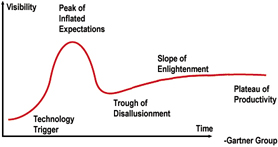TinyTagURL via del.icio.us?
One thing that caught my eye was how a TinyURL is used to capture the link. (TinyURL was first pointed out to me as a comment to this post on shortening URLs, along with the more meaningful notlong.com.)
All well and good - but the meaninglessnes the TinyURL doesn't really endear it to me, though it admittedly much shorter than the URL it redirects to.
What would be far more useful, I think, would be to be able to create a meaningful shortcut. del.icio.us can actually get me quite close, as this link to my del.icio.us delicious tag shows, but it's still a neighbourhood search, rather than a one-to-one redirection link (this is an injective mapping, I think...the other, one-to-many case does not make much sense in terms of mathematical functions, although many-to-one mappings are more reasonable...).
What I'd really like is to be able to generate a del.icio.us.ly simple URI that somehow reflects the tag, or tags, I have used...this could perhaps be as simple as just adding a link number onto the end of the URI - e.g. http://del.icio.us/psychemedia/delicious#nn or http://del.icio.us/psychemedia/delicious/nn. The number (nn) is still arbitrary, but the rest of the URI is meaningful...and even without the actual link number (which may be set using a user preference, perhaps) still gets me close...




